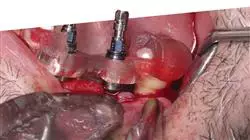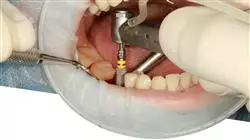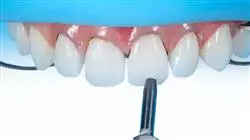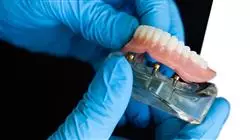University certificate
The world's largest faculty of dentistry”
Why study at TECH?
Enroll now and acquire new skills on Functional Diversity and Geriatric Patient Care in the Dental Clinic, quickly and in a 100% online modality”

The acquisition of knowledge and skills in functional diversity and geriatric patient care not only benefits the patient, but is also positive for the dentist himself. By being prepared to care for patients with special needs, the professional will be able to develop skills and competencies that will help them to povide more comprehensive and humanized care. In addition, this can help increase satisfaction and improve the image of the clinic, which in turn translates into greater business opportunities.
For this reason, TECH has designed a Postgraduate diploma in Functional Diversity and Geriatric Patient Care in the Dental Clinic with the aim of providing students with the necessary skills and competencies to be able to perform their work as specialists with the highest possible efficiency and quality. Thus, throughout this program, aspects such as the Identification of the PCR Patient, the Clinical Assessment of the Coma Patient of the Coma Patient, Oral Ulcers, Physiological Changes Associated with Aging, Dental Management or Mild Sedation.
All this, through a convenient 100% online mode that allows students to organize their schedules and studies, combining them with their other work and interests of the day to day. In addition, this degree has the most complete theoretical and practical materials on the market, which facilitates the student's study process and allows them to achieve their goals quickly and efficiently.
Addresses in depth aspects such as Preventive Actions in the Dental Clinic or Macroscopic Changes, in a few weeks and with total freedom to organize schedules”
This Postgraduate diploma in Functional Diversity and Geriatric Patient Care in the Dental Clinic contains the most complete and up-to-date scientific program on the market. The most important features include:
- The development of case studies presented by experts in Functional Diversity and Geriatric Patient Care in the Dental Clinic
- The graphic, schematic, and practical contents with which they are created, provide scientific and practical information on the disciplines that are essential for professional practice
- Practical exercises where self-assessment can be used to improve learning
- Its special emphasis on innovative methodologies
- Theoretical lessons, questions to the expert, debate forums on controversial topics, and individual reflection assignments
- Content that is accessible from any fixed or portable device with an Internet connection
Access all the content on Clinical Assessment of the Coma Patient from any device with internet connection, whether Tablet, mobile or computer”
The program’s teaching staff includes professionals from sector who contribute their work experience to this educational program, as well as renowned specialists from leading societies and prestigious universities.
Its multimedia content, developed with the latest educational technology, will provide the professional with situated and contextual learning, i.e., a simulated environment that will provide an immersive education programmed to learn in real situations.
The design of this program focuses on Problem-Based Learning, by means of which the professional must try to solve the different professional practice situations that are presented throughout the academic course. For this purpose, the student will be assisted by an innovative interactive video system created by renowned experts.
Delve into all the essential aspects of the Functionally Diverse Patient or the Theories of Aging, from the comfort of your home and at any time"

Achieve professional success in one of the most promising areas of Dentistry, thanks to TECH and the most innovative didactic materials"
Syllabus
The structure and didactic resources of this curriculum have been designed by the renowned professionals that make up the TECH team of experts in this area of Odontology. These specialists have used their extensive experience and their most advanced knowledge to create practical and completely updated contents. All this, based on the most efficient teaching methodology, TECH's Relearning.

Expand your knowledge about the Functionally Diverse Patient and the Elderly Patient, thanks to the most innovative didactic materials and a wide variety of additional content available on the Virtual Campus”
Module 1. The patient with functional diversity in the dental clinic
1.1. The patient with functional diversity
1.1.1. The patient with functional diversity. Definitions
1.1.2. Oral manifestations
1.1.3. Barriers to dental treatment
1.2. Behavior management
1.2.1. Behavior Management Techniques
1.2.2. Protective stabilization
1.2.3. Necessary Material
1.3. Sedation and General Anaesthesia
1.3.1. Indications
1.3.2. Mild sedation
1.3.3. Deep sedation and general anesthesia
1.4. Prevention
1.4.1. Risk assessment of our patients
1.4.2. Home preventive actions
1.4.3. Preventive actions in the Dental Clinic
1.5. Tratamiento odontológico
1.5.1. Decision Making
1.5.2. Limitations
1.5.3. Specialty treatments
1.6. Patients. with Intellectual Disabilities
1.6.1. Patients. with Intellectual Disabilities. Definition
1.6.2. Oral manifestations
1.6.3. Dental Management
1.7. Down Syndrome
1.7.1. Downs syndrome Definition
1.7.2. Oral manifestations
1.7.3. Dental Management
1.8. Autism Spectrum Disorders
1.8.1. Autism Spectrum Disorder. Definition
1.8.2. Oral manifestations
1.8.3. Dental Management
1.9. Cerebral Palsy
1.9.1. Cerebral Palsy. Definition
1.9.2. Oral manifestations
1.9.3. Dental Management
1.10. Rare Diseases
1.10.1. Rare Diseases Definition
1.10.2. Most Common Rare Diseases
1.10.3. Dental Management
Module 2. Dental care in the elderly patient
2.1. Geriatrics
2.1.1. Demographic changes in our society
2.1.2. The general health of the elderly. Major Geriatric Syndromes
2.1.3. Concept and social-health classification of the elderly
2.2. Aging and Physiological Changes of the elderly
2.2.1. Theories of Aging
2.2.2. Physiological Changes Associated with Aging
2.2.3. Pharmacotherapy for the elderly
2.3. Comprehensive geriatric assessment
2.3.1. Clinical and functional evaluation
2.3.2. Mental health assessment and cognitive decline
2.3.3. Assessment of the socioeconomic situation
2.4. Oral aging
2.4.1. Macroscopic changes
2.4.2. Macroscopic changes
2.4.3. Function changes
2.5. Conservative treatment in elderly dental patients
2.5.1. Treatment of caries in the elderly
2.5.2. Endodontic treatment in the elderly
2.5.3. Prosthetic treatment in the elderly
2.6. Periodontal treatment in elderly dental patients
2.6.1. Prevalence of periodontal disease in the elderly
2.6.2. Periodontal treatment in the frail patient
2.6.3. Periodontal Disease and Alzheimer's Disease
2.7. Preventive treatment in elderly dental patients
2.7.1. Caries and periodontal disease preventive treatment
2.7.2. Brushing techniques and oral care for functionally dependent elderly people
2.7.3. Prevention protocols in geriatric centers
2.8. Most common oral pathology in the elderly
2.8.1. Dry mouth syndrome
2.8.2. Oral candidiasis and stomatitis due to prosthesis
2.8.3. Oral ulcers
2.8.4. Others: epulis, hypermobile tissue, fibroma, saburral tongue, burning mouth syndrome and oral cancer
2.9. Home dental care for the elderly
2.9.1. Concept and examples in neighboring countries
2.9.2. Home dental care treatment possibilities
2.9.3. Future of dental home care
2.10. Dental care for the palliative care patient
2.10.1. clinical characteristics of the patient in palliative care
2.10.2. Dental Management for the palliative care patient
2.10.3. Clinical Cases
Module 3. Management of urgent and emergency situations in the dental office
3.1. Critical Patients Conceptualization
3.1.1. Critical Patients
3.1.2. Emergency Care
3.1.3. Gravity Standardization
3.1.4. Alert and Alarm Criteria
3.2. Technical resources for the control of urgencies and emergencies in a dental cabinet
3.2.1. Airway
3.2.2. Venous Route
3.2.3. Monitoring
3.3. Applied pharmacology: basic active principles for use in urgencies and emergencies in a dental cabinet
3.3.1. Cardiovascular sphere
3.3.2. Respiratory sphere
3.3.3. Neurological sphere
3.4. Alterations in the Level of Consciousness
3.4.1. Coma: conceptualization
3.4.2. Clinical assessment of the coma patient
3.4.3. Action sequence for the patient with deteriorated level of consciousness
3.5. Shock
3.5.1. Shock. Concept
3.5.2. Classification: special study of anaphylactic shock as a model of distributive shock
3.5.3. Actions in case of severe anaphylaxis
3.6. Syncope
3.6.1. Syncope. Conceptualization
3.6.2. Classification
3.6.3. Basic actions for the management of the patient with syncope depending on the probable origin of the syncope
3.7. Acute Coronary Syndrome (ACS)
3.7.1. Conceptualización: angina vs infarto: tipología
3.7.2. Identification of alarm criteria in a patient with ACS
3.7.3. Sequence of action for management of a patient with ACS in the dental office
3.8. Acute complications of AHT
3.8.1. Acute Complications of AHT Conceptualization
3.8.2. Hypertensive Crisis and hypertensive Emergency
3.8.3. Basic actions for the control of hypertensive emergencies
3.9. Acute Metabolic Complications
3.9.1. Acute Metabolic Complications. Conceptualization
3.9.2. Acute diabetic decompensations
3.9.3. Actions for the management of the patient with symptomatic hypo / hyperglycemia
3.10. BLS (basic life support) / IVS (immediate life support): European Resuscitation Council
3.10.1. Conceptualization
3.10.2. Identification of the PCR patient: prevention
3.10.3. Algorithms of action for patients with CRP

Thanks to the most efficient teaching methodology, TECH Relearning, you will be able to acquire new knowledge in a precise and natural way, without spending too much time studying”
Postgraduate Diploma in Functional Diversity and Geriatric Patient Care in the Dental Clinic
The Postgraduate Diploma in Functional Diversity and Geriatric Patient Care in the Dental Clinic of TECH Tecnological University focuses on the Practical Training of the dental professional in the care of patients with special needs. This postgraduate program offers solid education in the management of geriatric patients and patients with functional diversity, ensuring a comprehensive and appropriate approach to each situation. In this program, special attention will be paid to updating the following aspects the identification of the different types of functional and geriatric diversity in dental care; and the adaptation of dental procedures for patients with special needs.
Dental care for geriatric patients and patients with functional diversity requires specific and up-to-date preparation in order to provide adequate and quality care. This postgraduate course allows dental professionals to expand their skills and knowledge in this area, providing comprehensive and personalized care to each patient. In the Postgraduate Diploma in Functional Diversity and Geriatric Patient Care in the Dental Clinic you will learn to apply specific techniques for dental care in geriatric patients and patients with functional diversity, as well as to understand the psychological and social implications of caring for these patients.







